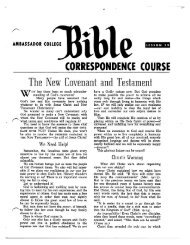Plain Truth 1978 (Prelim No 04) Apr - Herbert W. Armstrong
Plain Truth 1978 (Prelim No 04) Apr - Herbert W. Armstrong
Plain Truth 1978 (Prelim No 04) Apr - Herbert W. Armstrong
Create successful ePaper yourself
Turn your PDF publications into a flip-book with our unique Google optimized e-Paper software.
unit has become an alliance of<br />
. two self-contained egos who<br />
will be faithful only as long as<br />
the terms of the "treaty" remain<br />
advantageous.<br />
And since we cherish our singularity,<br />
we flee commitment. We believe<br />
it is better to live together<br />
without benefit of clergy-that<br />
way, no one really has to give up<br />
an ything. As psychoanalyst <strong>Herbert</strong><br />
Henden has said, our culture has<br />
made caring seem like losing. And<br />
so couples live together unmarried.<br />
It is the way to enjoy a readily accessible<br />
sex partner without having<br />
to surrender any of one's individual<br />
sovereignty. And none dare call it<br />
"fornication," to our ears a slightly<br />
antiquated word which suggests a<br />
time when people looked outside<br />
themselves for their moral standards.<br />
Other ages saw sex in terms<br />
of a transcendent morality. Today,<br />
we make hobgoblins out of "repression"<br />
and "inhibition"; they are our<br />
hobgoblins because they cause us to<br />
restrain ourselves.<br />
Sex , for us moderns, has been reduced<br />
to so many neurons firing in<br />
the brain: an affair of the nervous<br />
system, not of the heart and emotions.<br />
Consider the modern sex<br />
manuals. They are mostly written<br />
without consideration of what in<br />
other times was called (here is another<br />
quaint phrase) the "sanctity of<br />
marriage." Rather they are written<br />
for "sex partners." And sex is<br />
presented as technique. A workout.<br />
A set of gymnastic exercises to be<br />
learned much like a quarterback<br />
manages football plays. But sex is<br />
not considered to be an expression<br />
of love, the prototype of God's love<br />
for His people.<br />
<strong>No</strong>, that's all syrupy Victorian<br />
drivel. We moderns are interested in<br />
getting our neurons to fire at the<br />
right time. Sex is the relief of tension.<br />
But it is not love . And no oneincluding<br />
God-is going to put a<br />
crimp in our sexual style.<br />
Or consider another best-seller,<br />
the Hite Report. It is a hymn to<br />
masturbation. Why, it asks, should a<br />
woman worry about sexual fulfillment<br />
with her "partner" when she<br />
can do it all herself'? Why indeed.<br />
Ours is an age which does not simply<br />
tolerate masturbation, it glorifies<br />
it. Indeed, such a glorification<br />
The PLAIN TRUTH <strong>Apr</strong>il <strong>1978</strong><br />
is the logical extension of our preoccupation<br />
with the solitary, unrestrained<br />
self.<br />
Moderation in All Things<br />
So what's wrong with our culture's<br />
glorification of the self'?<br />
It is a problem of balance. Mao's<br />
China, where individuality was systematically<br />
expunged and the self<br />
was made to merge into a kind of<br />
collectivist mud, obviously does not<br />
embody the good life. We are worth<br />
something in ourselves, because it is<br />
true that in one sense our selves are<br />
all we've got. But much more than<br />
that, we are worth something because<br />
we are made in the image of<br />
God. And that is the error that our<br />
modern culture-at least this phase<br />
of it-has made. God is shut out of<br />
the how-to-get-power universe. He<br />
is not part of the intimidate-yourway-to-success<br />
books. He is excl<br />
uded from the joy-of-sex<br />
manuals.<br />
The psychological reason God is<br />
excluded from the modern mind-set<br />
is that God is incompatible with our<br />
personal sovereignty. God has authority,<br />
legitimate authority: When<br />
we acknowledge God, we acknowledge<br />
we are not the masters of the<br />
uruverse,<br />
C. S. Lewis describes the attitude<br />
we get into in wanting to uphold the<br />
sovereignty of the overweening self.<br />
In his autobiography, Lewis tells us<br />
why, as a onetime atheist, it was so<br />
important to him that God not be<br />
acknowledged as part of reality:<br />
"What mattered most of all was my<br />
deep-seated hatred of authority, my<br />
monstrous individualism, my lawlessness.<br />
<strong>No</strong> word in my vocabulary<br />
expressed deeper hatred than the<br />
word interference. But Christianity<br />
placed at the center what then<br />
seemed to me a transcendental<br />
Interferer" (Surprised by Joy, p.<br />
172).<br />
But our self-seeking is ultimately<br />
counterproductive. Happiness cannot<br />
be directly made its own end.<br />
And yet happiness is the proper end<br />
of all our activity. Are we caught in<br />
some monstrous cosmic paradox,<br />
condemned by some malevolent<br />
God to misery because we seek our<br />
own happiness and are thereby<br />
barred from it?<br />
Fortunately, the universe has not<br />
been contrived by a malevolent<br />
God; rather by a loving Creator<br />
who has ordained that man should<br />
indeed be happy. But that ultimate<br />
happiness can only come from<br />
doing the will of the Creator.<br />
We can better understand the<br />
reason for this principle if we consider<br />
what Lewis says later on in his<br />
autobiography about not being able<br />
to achieve happiness by seeking it<br />
directly. Lewis relates how he finally<br />
learned the principle that we cannot<br />
"enjoy" something while we are at<br />
the same time "contemplating" it:<br />
"It seemed to me self-evident that<br />
one essential property of love, hate,<br />
fear, hope, or desire was attention to<br />
their object. To cease thinking about<br />
or attending to [a person with whom<br />
one is in love] is, so far, to cease<br />
loving; to cease thinking about or<br />
attending to the dreaded thing is, so<br />
far, to cease being afraid. But to<br />
attend to your own love or fear is to<br />
cease attending to the loved or<br />
dreaded object. In 'other words the<br />
enjoyment and contemplation of<br />
our inner activities are incompatible.<br />
You cannot hope and<br />
also think about hoping at the same<br />
moment, for in hope we look to<br />
hope's object and we interrupt this<br />
by (so to speak) turning around to<br />
look at the hope itself' (Surprised by<br />
Joy, p. 218) .<br />
Lewis seems to be saying that we<br />
cannot be happy if our attention is<br />
directed to our own happiness.<br />
What might at first appear to be a<br />
paradox is really simply the way the<br />
human mind works.<br />
But it is a lesson at least temporarily<br />
lost on America in the 1970s.<br />
We shall continue our pursuit of the<br />
wind: the vain emptiness of trying<br />
to attain happiness by concentrating<br />
on our own happiness itself, instead<br />
of seeking it in the service of God.<br />
The words of Christ may stick in our<br />
throats; we may hide from them,<br />
seek to bury them, banish them<br />
to the nether worlds of our consciousness,<br />
but they are nonetheless<br />
true:<br />
"Truly, truly, I say to you, unless<br />
a grain of wheat falls into the earth<br />
and dies, it remains alone; but if it<br />
dies, it bears much fruit. He who<br />
loves his life loses it, and he who<br />
hates his life in this world will keep<br />
it for eternal life ." 0<br />
15

















